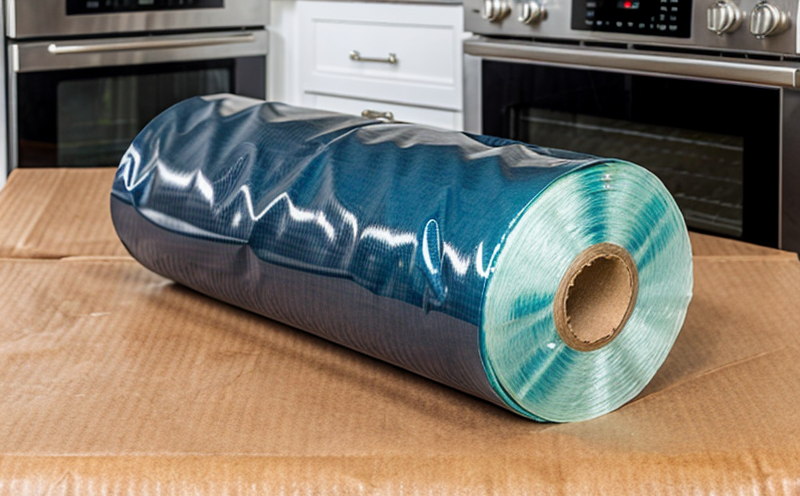ISO 527 Tensile Strength Testing of Plastic Household Covers
The ISO 527 standard provides a detailed protocol for tensile testing various types of plastics, including those used in household wraps and covers. This service is particularly relevant to the sector of polymer and plastics testing where ensuring the durability and performance of materials is critical.
Tensile strength testing plays a pivotal role in evaluating the mechanical properties of plastic materials under tension. For household wraps and covers, this test ensures that the material can withstand stress without breaking or deforming excessively. The test involves stretching a specimen until it breaks, measuring both the force applied and the elongation at failure.
The ISO 527 standard specifies several methods for tensile testing, including parallel-plate grips, V-groove grips, and special fixtures designed to handle complex geometries. For household wraps and covers, the choice of grips is crucial as it affects the accuracy of the test results and can influence the reproducibility.
The process typically involves preparing a standard-sized specimen from the plastic material used in the wrap or cover. The specimen must be free from defects that could affect the test outcome. It's important to note that the preparation method can vary depending on the specific requirements of the ISO 527 variant being used.
Once prepared, the specimen is clamped into a tensile testing machine and subjected to controlled loading until failure occurs. The machine records data such as load versus extension, which are then analyzed to determine key mechanical properties like tensile strength, yield strength, and elongation at break.
The results of this test are critical for quality assurance in the production process. They help ensure that household wraps and covers meet the required standards for durability and performance. This is particularly important for products used in various environments, from kitchen use to outdoor applications.
Understanding tensile behavior under different conditions can also inform product design and material selection. For example, if a household wrap needs to withstand high temperatures or extreme weather conditions, understanding its tensile properties at these extremes can guide the choice of materials and manufacturing processes.
- Customer Impact: Ensures that products are reliable under real-world conditions, enhancing customer satisfaction.
- Safety: Helps identify potential failure points in designs, reducing risks to end-users.
- Regulatory Compliance: Meets industry and government standards ensuring legal compliance.
In summary, ISO 527 tensile strength testing is a cornerstone of quality assurance for household wraps and covers. It provides essential data that informs product design, ensures regulatory compliance, and enhances customer satisfaction by delivering reliable products.
Benefits
The benefits of ISO 527 tensile strength testing are manifold, touching on various aspects of the product lifecycle. Firstly, it provides critical data for quality assurance, ensuring that every batch of household wraps and covers meets the required standards. This not only enhances product reliability but also builds trust with customers.
Secondly, the test results can inform design improvements. By understanding how materials behave under tension, manufacturers can make informed decisions about material selection and process optimization. This leads to products that are more durable and perform better in real-world conditions.
Thirdly, regulatory compliance is a key benefit of this testing. Meeting industry and government standards ensures that the products are safe for use and comply with legal requirements. This reduces the risk of recalls or legal issues, protecting both the manufacturer and the end-user.
The test also contributes to sustainable practices by identifying materials and processes that minimize waste and energy consumption during manufacturing. By selecting materials that perform well under tension without compromising on sustainability, manufacturers can contribute positively to environmental goals.
Finally, customer satisfaction is significantly enhanced when products are reliable and meet the expected performance levels. This leads to repeat business and a positive reputation in the market, which is invaluable for any business.
Customer Impact and Satisfaction
- Reliability: Products that pass tensile strength testing are more likely to perform well under real-world conditions, leading to higher customer satisfaction.
- Safety: Ensuring materials can withstand tension reduces the risk of product failure, enhancing user safety.
- Trust: Compliance with international standards builds trust between manufacturers and customers.
- Sustainability: By selecting durable materials, manufacturers contribute to a more sustainable production process.
Customer satisfaction is paramount in any business. Reliable products that meet performance expectations lead to positive customer experiences and brand loyalty. This is achieved through rigorous testing such as ISO 527 tensile strength testing, which ensures that every batch of household wraps and covers meets the highest standards of quality.
Environmental and Sustainability Contributions
ISO 527 tensile strength testing plays a crucial role in promoting sustainability within the polymer and plastics sector. By ensuring that materials used in household wraps and covers are robust, manufacturers can reduce waste associated with product failures.
The test helps identify materials that have excellent tensile properties while also being environmentally friendly. This includes selecting biodegradable or recyclable options where appropriate. By minimizing waste and energy consumption during the manufacturing process, companies contribute positively to environmental goals.
Furthermore, understanding how materials behave under tension can inform design decisions that lead to longer-lasting products. Longer-lived products reduce the need for frequent replacements, further reducing resource depletion and environmental impact.
The test also supports sustainable practices by helping manufacturers identify the most efficient processes to produce their products without compromising on quality or performance.





